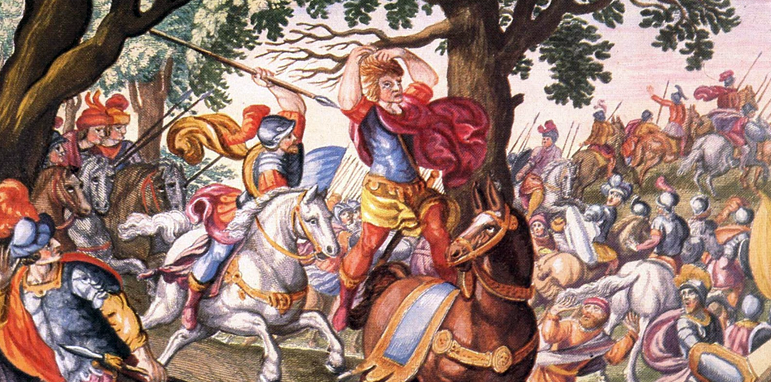Written by Sr. Rosemary, O.P.
Readings from: http://www.usccb.org/bible/readings/020420.cfm
We heard a very interesting story in the first reading about a fellow named Absalom, especially the part about how he died. Who was he anyway and what can we learn from the story?
The name ‘Absalom’ comes from the Hebrew and means "my father is peace". Absalom was the third son of King David and earlier in the book of Samuel we learn that “in all of Israel there was no one so much to be praised for his handsome appearance as Absalom. From the sole of his foot to the crown of his head there was no blemish.” [2 Samuel 14:25]. It also mentions he had beautiful long hair, which ironically, contributed to his death.
But he was the rebellious son and with all of his fine blessings and good fortunes in life, Absalom couldn’t suppress this rebellious streak. First, he kills his older half-brother and heir to the throne, Amnon, for abusing their sister. Fearing reprisal from his father, flees Jerusalem for a few years. Eventually they reconcile and Absalom returns.
However, once back in Jerusalem, Absalom wastes no time conspiring against his father because Absalom is ambitious and wants to be king. Eventually, he wins over the hearts of the people and declares himself king, forcing David to flee. David raises an army that would finally defeat Absalom but, in an attempt to escape, the young son jumped on a mule and fled. We heard today how Absalom’s famous hair got caught and tangled up in an oak tree leaving him there dangling powerlessly “between the earth and the heavens.”
David’s army commander orders Absalom killed despite David’s firm orders that no harm should come to him. Upon hearing of his death, David famously laments “O my son Absalom, my son, my son! Would I had died instead of you, O Absalom, my son, my son!”
We can take away many lessons from this story, but here are two:
- Granted, all these men were guilty of treachery and committing horrendous crimes against each other to serve a selfish end. But deep down, David loved his sons despite all their failings. In David's love for his sons we see a reflection of the unconditional love of a father for his children. That message, that God loves all God’s children, is a recurring element in the teachings of Jesus.
- Unfortunately, the story has a tragic end because they are unable to turn around and seek reconciliation from one another. We know all too well that unreconciled relationships cause deep wounds that never seem to completely heal. Unresolved conflicts and unforgiveness can, and do, damage our emotional, spiritual and physical health. The only possible way for us to be reconciled with another is through forgiveness.
Perhaps today we can reflect on our own relationships and any anger and bitterness we may have towards another. Let us pray for the grace of forgiveness so we can learn to be kind and compassionate toward others, forgiving each other, as God has forgiven us.


